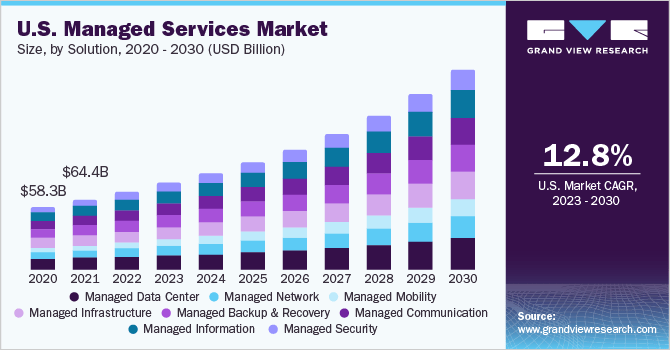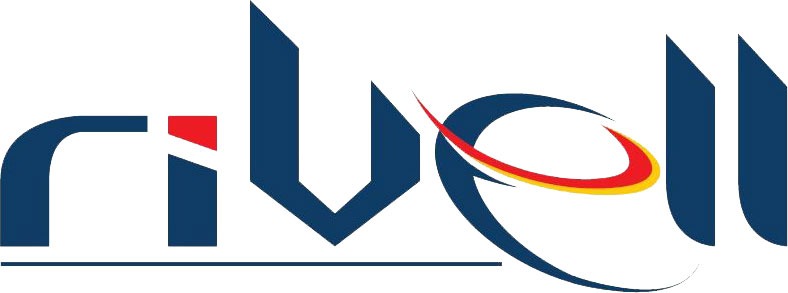Defining Managed IT Services
Managed IT Services (MITS) refer to the outsourcing of specific IT functions to a third-party provider. The goal is to enhance efficiency, reduce costs, and enable businesses to focus on their core competencies. The evolution of Managed IT Services reflects the dynamic nature of technology, from initial break-fix solutions to becoming strategic partners in business success.
What is the Outlook for the Managed Services Market?
1. Rapid Growth and Market Expansion
The managed services market is experiencing robust growth driven by businesses recognizing the value of outsourcing IT functions. This growth is fueled by the diverse range of services in demand, from infrastructure management to cybersecurity and beyond. The market is poised for expansion as businesses increasingly rely on external expertise to navigate the complexities of their IT landscape.
2. Increasing Adoption of Cloud Services
Cloud services are becoming integral to modern business operations, and the future of Managed IT Services will witness a surge in demand for cloud management and migration services. Providers are instrumental in optimizing and securing hybrid and multi-cloud environments, ensuring businesses harness the full potential of cloud technologies.
3. Emphasis on Cybersecurity Services
With cyber threats becoming more sophisticated, there is a growing demand for robust cyber security solutions. Managed services providers are expected to play a crucial role in fortifying the digital fortresses of businesses. The outlook includes proactive cybersecurity measures such as predictive analytics, AI-driven threat detection, and comprehensive incident response plans.
4. Strategic Focus on Data Management
The sheer volume of data generated in today’s digital age necessitates efficient data management. Managed IT Services providers will play a pivotal role in offering comprehensive data management solutions, covering aspects such as storage, analytics, and governance. The strategic focus on data management reflects the importance of deriving actionable insights from the wealth of information available.
5. Integration of Artificial Intelligence (AI) and Automation
AI and automation are becoming integral components of Managed IT Services. Providers leverage these technologies to enhance operational efficiency, automate routine tasks, and deliver proactive services. This integration not only optimizes costs but also elevates the overall quality of service delivery, positioning Managed IT Services as a proactive and innovative solution.
6. Industry-Specific Solutions
The future sees Managed IT Services providers tailoring their offerings to meet the unique challenges and compliance requirements of various sectors. This shift towards industry-specific solutions ensures that businesses receive targeted and effective services that align with their specific needs. Managed IT Services providers are poised to become strategic partners, deeply understanding the intricacies of different industries.
7. Focus on Customer Experience
Customer experience emerges as a key differentiator in the Managed IT Services landscape. Providers will prioritize understanding the unique needs of their clients, offering personalized solutions, and ensuring seamless service delivery. This customer-centric approach reflects the evolving role of Managed IT Services providers from being service vendors to strategic allies in achieving business objectives.
8. Globalization and Market Consolidation
The globalization of managed services is evident as providers extend their reach to serve clients on a global scale. Simultaneously, market consolidation is expected as providers seek strategic partnerships and acquisitions to strengthen their service portfolios and geographic presence. These trends signify a maturing market where providers aim for a broader and more diversified footprint.
Why Are Managed IT Services Important?
1. Cost Efficiency and Predictable Budgeting
One of the key advantages of Managed IT Services is cost efficiency. By eliminating the need for in-house IT staff and providing predictable monthly costs, businesses can streamline their budgets. Managed IT Services becomes a cost-effective solution, allowing businesses to allocate resources more strategically.
2. Proactive Maintenance and Issue Prevention
Proactive maintenance is a hallmark of Managed IT Services. Providers anticipate and address issues before they escalate, ensuring smooth operations and minimizing disruptions. This proactive approach contributes significantly to business continuity and operational reliability.
3. Access to Specialized Skills and Expertise
The IT landscape is vast and complex, requiring specialized skills. Managed IT Services provides businesses with access to a pool of experts with diverse skills, ensuring that they benefit from the latest technologies and best practices. This access to specialized expertise is crucial in staying competitive in rapidly evolving industries.
4. Enhanced Security and Compliance
Cybersecurity is a top concern for businesses, and Managed IT Services providers play a vital role in enhancing security. By implementing robust security measures and ensuring compliance with industry regulations, Managed IT Services becomes a trusted partner in safeguarding sensitive data and maintaining the integrity of IT systems.
5. Scalability and Flexibility
Business needs are dynamic, and Managed IT Services offers scalability and flexibility. Whether scaling up or down, businesses can adapt their IT infrastructure to match their current requirements. This scalability ensures that IT resources align with the evolving needs of the business, providing a nimble and responsive approach.
6. Focus on Core Business Functions
By outsourcing IT functions, businesses can focus on their core competencies. Managed IT Services becomes a strategic enabler, freeing up internal resources and allowing businesses to concentrate on strategic initiatives, innovation, and core business functions. This focus on core competencies is essential for sustained growth and competitiveness.
The Future of Managed IT Services
In the ever-evolving landscape of technology, the role of Managed IT Services (MITS) is taking center stage, promising businesses a future of efficiency, innovation, and unparalleled scalability. As we navigate the complexities of a digital era, let’s delve into the profound transformations and emerging trends shaping the destiny of Managed IT Services.
According to Grand View Research, The global managed services market size was estimated at USD 267.35 billion in 2022 and is anticipated to grow at a compound annual growth rate (CAGR) of 13.6% from 2023 to 2030.

Image Source : https://www.grandviewresearch.com/industry-analysis/managed-services-market
1. Automation Revolution
The future of MITS is intricately woven with automation. From routine tasks to complex processes, automation is streamlining operations, reducing costs, and enhancing overall system reliability. The deployment of AI-driven automation tools is expected to skyrocket, allowing IT teams to focus on strategic initiatives rather than mundane tasks.
2. Proactive Cybersecurity Measures
As cyber threats become more sophisticated, the future of Managed IT Services hinges on proactive cybersecurity. Predictive analytics, AI-based threat detection, and robust incident response plans are integral components. Security isn’t just a layer anymore; it’s a dynamic, evolving strategy to stay one step ahead of cyber adversaries.
3. Edge Computing Takes Center Stage
The proliferation of IoT devices is shifting the computing paradigm towards the edge. Managed IT Services are adapting to this trend by offering edge computing solutions, ensuring real-time data processing, reduced latency, and enhanced overall system performance. The edge is becoming the new frontier for innovation.
4. Hybrid Cloud Ecosystems
The future sees a seamless integration of on-premises infrastructure with public and private clouds. Managed IT Services providers are becoming orchestrators of hybrid cloud ecosystems, providing businesses with the flexibility to scale resources as needed while maintaining control over critical data.
5. Holistic Data Management
With the exponential growth of data, MITS is evolving to become stewards of information. This involves not just data storage but also effective data governance, analytics, and insights generation. Managed IT Services are becoming integral players in helping businesses unlock the true value of their data.
6. Customer-Centric Service Delivery
Tomorrow’s Managed IT Services will not just be about technical expertise; they will be about understanding and aligning with the unique needs of each customer. Customer-centric service delivery, personalized solutions, and a focus on enhancing the end-user experience will be the hallmark of successful MITS providers.
7. Agile and DevOps Integration
The future belongs to those who can adapt swiftly. Managed IT Services are increasingly adopting agile methodologies and integrating DevOps practices. This ensures rapid development, continuous delivery, and improved collaboration between development and operations teams, fostering a culture of innovation.
8. Robust Disaster Recovery Planning
As businesses rely heavily on digital infrastructure, the importance of robust disaster recovery planning cannot be overstated. Managed IT Services of the future will offer comprehensive disaster recovery solutions, ensuring business continuity even in the face of unforeseen challenges.
Conclusion
The future of Managed IT Services is a tapestry woven with threads of innovation, adaptability, and a relentless pursuit of excellence. As businesses embark on this journey, partnering with a forward-thinking Managed IT Services provider in nj will be the compass guiding them through the uncharted territories of tomorrow’s digital landscape. Embrace the future, where Managed IT Services isn’t just a service; it’s a strategic ally propelling businesses toward unparalleled success.









